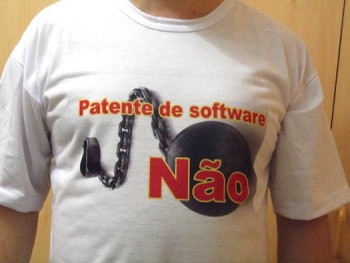Software patent abuse would seem to be on the decline if the amount of ink being given to the subject in the open source press is used as a metric. But as the old TV commercial used to ask: Is it live, or is it Memorex?
Five or six years ago the major GNU/Linux and FOSS news aggregators were filled with stories about software patents. These days, not so much. Does this mean that the threat posed by patents is actually less now than in 2010, or have patents simply not been getting the coverage they once did?
 There is no doubt that there have been many developments on the patent front that have been beneficial from a free tech standpoint. There was the 2014 Supreme Court ruling in Alice Corp. vs. CLS Bank, which immediately made a slew of patents unenforceable. This decision invalidated so-called “abstract” software patents, which basically sought patent protection for merely moving established but previously non-computer procedures to a computer (i.e., bookkeeping “on a computer”). Other developments include online retailer Newegg’s decision several years back to take all disputed patent infringement claims against it to court instead of settling. Although the results of this decision have led to a mixed bag of results, with notable wins and losses, it’s undoubtedly caused the trolls to think twice before threatening the company.
There is no doubt that there have been many developments on the patent front that have been beneficial from a free tech standpoint. There was the 2014 Supreme Court ruling in Alice Corp. vs. CLS Bank, which immediately made a slew of patents unenforceable. This decision invalidated so-called “abstract” software patents, which basically sought patent protection for merely moving established but previously non-computer procedures to a computer (i.e., bookkeeping “on a computer”). Other developments include online retailer Newegg’s decision several years back to take all disputed patent infringement claims against it to court instead of settling. Although the results of this decision have led to a mixed bag of results, with notable wins and losses, it’s undoubtedly caused the trolls to think twice before threatening the company.
The patent landscape has changed in other ways as well, with many revolving around the America Invents Act which took effect in 2012 and 2013. One provision of this bill that has been successfully leveraged is the “inter partes review,” or IPR, in which the non-patent holder petitions the Patent Trial and Appeal Board to rule on the validity of a patent.
Since instituted in 2012, the IPR provision has been used to have more than a few patents invalidated by PTAB. In March, for example, the board invalidated a “product activation” patent held by troll Uniloc on the grounds that all claims within the patent were either anticipated or made obvious by earlier patents. This was a big win for our side, as over the years the patent holder had sued around 75 companies — a list which includes our old buddy Microsoft — with a third of those settling out of court.
The IPR provision may or may not be weakened soon, however, when Cuozzo Speed Tech vs. Lee goes before the Supreme Court later this year.
Although there have been many improvements on the patent front, some things remain the same. For example, while Microsoft no longer makes use in FUD campaigns of its infamous 235 patents that are — according to Redmond — violated by Linux, neither has it repudiated their existence nor shown proof that they exist. In the meantime, the company continues to threaten Android mobile device makers with legal action unless they sign licensing agreements, which has reputedly made Google’s mobile operating system a billion dollar business for Microsoft.
This illustrates our concerns that just because the bar has been raised for trolls to successfully monetize dubious patents, this doesn’t necessarily mean that the threat posed to Linux and FOSS has been eliminated or reduced. Indeed, according to an article by Joe Mullin that appeared on Ars Technica in January, last year was a watershed year for patent lawsuits, with more patent related suits filed than in any year except 2013.
What do you think?
Here at FOSS Force we’re running a poll to better understand the perceptions held by FOSS advocates on the subject. By your reckoning, are patents still a threat? The four answers we offer in our poll run the gamut from “yup, a lot” to “nope, not at all.”
We quietly put the poll up on our front page on Thursday morning. Ninety-one percent of the votes cast so far indicate our readers think software patents remain a serious issue, even if the situation has somewhat improved over the last several years.
Give us your input. Take a few seconds to take our poll — and if you have anything to add feel free to write a comment to this article. We’ll give you our analysis of the poll results on Friday.
Editor’s note: The results of this 2016 poll were lost during an upgrade to our polling software.








You mention Microsoft’s FUD campaigns regarding their patent claims against Linux. Specifically against Android device makers they are still (or were at least up to the last few weeks) threatening such manufacturers.
however, SJVN (over at ZDNet) writes about that here:
http://www.zdnet.com/article/the-one-thing-microsoft-needs-to-do-to-gain-real-open-source-trust/
where he refers to another article:
http://www.zdnet.com/article/310-microsoft-patents-used-in-android-licensing-agreements-revealed-by-chinese-gov/
that reveals that the Chinese govt has posted details of these patents online.
I haven’t personally checked out that claim, but if so, there should be (ought to be) device vendors standing up against MS, if there are any such vendors remaining who haven’t already drunk the MS kool-aid.
Or they are concentrating on lobbying for TPP, TTIP, and TISA because getting those through would eliminate FOSS while cementing software patents in place at the same time.
I think that software patents are a drag on the entire software industry. I don’t think that FOSS software is any more threatened by software patents than proprietary software is threatened. I think that the entire software industry should stand united against the existence of software patents.
I think that proprietary companies which think that they can profit from software patents are like gamblers who delude themselves into thinking that they can beat the house odds. A few do but the vast majority lose.
——————–
Steve Stites
Software patents need to be abolished worldwide.
Nothing good for society ever came from a software patent.
From the link you site: “But the latest leak has revealed more. The agreement would also prohibit countries from enacting free and open source software mandates. ”
The above language does not imply a prohibition of FOSS use, it only implies that proprietary software cannot be mandated out. That’s called democracy.
” Software patents need to be abolished worldwide.
Nothing good for society ever came from a software patent.”
Why such an extremist opinion? Software is a tool, that’s all. Intellectual property of developers is worth protecting. If you don’t like it, write your own.
Harry, that’s the whole issue with a software patent.
If I “don’t like it”, and write my own as you say, and it shares any kind of look, feel, or functionality of YOUR software, your way of thinking seems to be that the similarity entitles you to a royalty, even though you had nothing to do with my software, other than my distaste for it.
@Harry Sachs
> “Why such an extremist opinion? Software is a tool, that’s all. Intellectual property of developers is worth protecting. If you don’t like it, write your own.”
Not extremist at all. I am a developer and I do indeed write my own. Software is already protected by copyright. Patents are unneeded to protect a developer’s work. In fact, they do no such thing. They are only a club used to destroy anyone who dares try to do the same thing. They are nothing but a boat anchor to progress and innovation.
Incidentally, software is much more than a tool. It can be a tool, a toy, or a piece of art, among other things.
I also don’t subscribe to the incredibly loaded term:”intellectual property”. It’s nonsense foisted upon the public by huge media conglomerates.
@Harry Sachs
“The above language does not imply a prohibition of FOSS use, it only implies that proprietary software cannot be mandated out. That’s called democracy.”
You seem to have confused democracy with corporatism.
Whether or not you mandate FOSS or proprietary software has nothing whatsoever to do with democracy. Such a rule can be enacted under any type of government.
That those treaties were written, negotiated, and approved in secret runs completely counter to your claim of “democracy”.
Under those treaties, if a country wanted to (via popular vote or any other method) decide to mandate the use of open source software in government (say for transparency and reuse purposes), they would be prevented from doing so.
That is in no way “democracy”. It is blatant bullying by corporations to prevent the spread of freedom respecting software that happens to undercut their profit stream. To that I say: Screw them. If the free spread of information undercuts your business model, then your business model is broken and needs to go the way of the dinosaur.
17 years. No more patent. Merck recently won a patent suit against Gilead. I guess in your world that’s immoral ?
@Estes Parke
Software is already protected by copyright. Patents harm innovation, which is exactly opposite their intended function.
Not all patents are as pointless and harmful as software patents, although pharmaceutical patents are right up there as well.
Patent battles between pharmaceutical companies are hardly a useful way to demonstrate their benefit to society. My son requires a medication that costs $1000 per month. Is it rare or difficult to make? No, but it is price fixed because of the guaranteed monoply the maker gets due to patents. Increasingly, pharmaceutical companies and others are looking at patenting human genes, and using patent granted monopolies to extort money from ill people like that disgusting worm Martin Shkreli did. You think he is the exception? Look again. Yes, I’d say that’s immoral in my world, and any other world.
Sorry, but the patent (and copyright) system as it is today is indefensible. It is corrupt, perverted by powerful lobbying, and broken.